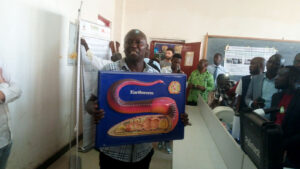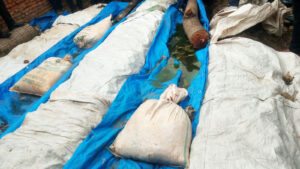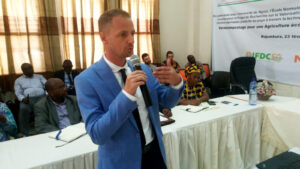The use of vermicompost contributes to improving agricultural yield. This emerges from the research results carried out by experts from the Ecole Normale Supérieure and the University of Ngozi as part of the research project on the valorization of earthworms from Burundi and organic waste produced through vermicomposting technology under the financing of the Dutch embassy through‘IFDC. This is why experts are asking the government to take ownership of the popularization of the vermicomposting technique to improve food security and household income.

Vermicomposting has several advantages. The development of this technique allows the improvement of agricultural production and the resistance of crops to different pathologies thanks to the use of vermicompost which is the organic amendment resulting from vermicomposting.
This was clarified by researcher Eric Gilbert Kazitsa during the open day for the research project on the valorization of earthworms from Burundi and organic waste produced through vermicomposting technology under the theme “Vermicomposting for agriculture ecological, productive and sustainable” organized on Friday February 23, 2024 by the Ecole Normale Supérieure in partnership with the University of Ngozi.
According to Kazitsa, the research work they have carried out shows that the use of vermicompost contributes a lot to the productivity of crops such as tomatoes and beans.
The use of vermicompost corrects the acidity of the soil
According to him, the reason is that this fertilizer corrects the acidity of the soil which constitutes a major challenge to the Burundian agricultural sector. The majority of Burundi’s cultivable soils are acidic and poor in nutrients. Which severely limits national agricultural production.
Vermicompost, a type of compost produced using the activity of composting earthworms can help meet this challenge. It makes the soil fertile as the results of this research show, explains Kazitsa.
What about potentially vermicompostable materials?
According to Kazitsa, the investigations carried out revealed that different potentially vermicompostable materials are produced by the thousands of tonnes in Burundi each year. These materials include, among others, waste found in urban markets, waste from urban slaughterhouses, waste from sugar cane, oil palm and bananas, cow and pig manure, straw and rice husks.


He explains that materials of interest also include invasive plants such as Tithonia diversifolia, Eicchonia crassipes and Lantana camara because of the environmental risks they pose.
He also indicates that the study of earthworms revealed that there are species of earthworms in different regions of Burundi that can help compost these materials, including the African composting worm Eudrilus eugenicae, which is very popular in vermicomposting.
These species have been multiplied. Data on vermicomposting parameters, macro and trace nutrient content, toxicological and microbiological analyzes showed that the activity of these earthworms allows the production of high agronomic and healthy quality vermicompost in 3 to 4 month.
The agronomic quality of the vermicomposts produced was confirmed by data from agronomic trials carried out on tomatoes and beans.
These tests revealed that the identified earthworms produce vermicompost which allows rapid improvement and persistence of soil fertility parameters.
It also allows excellent growth, vigor and productivity of crops.
That the government take ownership of the popularization of the vermicomposting technique
He then asks the government and the population to take ownership of the popularization of this technology to boost agricultural production.
Future research could look into the possibilities of developing organic agriculture with vermicompost, the valorization of vermicomposting by-products, the effects of vermicompost on the structure and biotic parameters of soil fertility and crop productivity. (stress tolerance, genetic expression, etc.) as well as the combined effects of vermicompost, liming, earthworms and agricultural techniques.
Earthworms, a resource instead of a waste
Apollinaire Bangayimbaga, Rector of the University of Ngozi, is delighted with these research results, the objective of which is to boost agricultural production while preserving the environment. According to him, this is an important thing because the Ecole Normale Supérieure has worked hand in hand with the University of Ngozi to make earthworms a resource instead of a waste.
These are now resources, he explains. He then asks the population to seize the opportunity to make their agricultural activities profitable.
The general director of ENS thanks the lessor
Hassan Nusra, general director of ENS, agrees. She is delighted that experts from ENS and the University of Ngozi were able to demonstrate the added value of the vermicomposting technique in enhancing the agricultural sector. She thanks the Netherlands and the IFDC who financially supported this research and asks them to continue in the same direction to contribute to the development of the country.


The one who represented the Dutch embassy in Burundi affirms that this embassy is ready to support the development of vermicomposting, because it has been noted that the use of vermicompost is very useful for the agricultural sector.
This is why he suggested working on three pillars which are, among other things, the popularization of training on vermicomposting for farmers and other actors working in this sector.
And to add the development of the entire sector to allow farmers to easily access vermicomposts.
In addition, he pointed out that research into the development of vermicomposting must continue with a view to improving food security and household income.
Note that Micaël BEUN reports that the Vermicomposting project was financed by the Dutch embassy in Burundi through the IFDC as part of the Pagris project. It was initiated to correct the acidity of the soil which is observed in a large part of the country. It started in January 2022 and will end in March 2024.
#Burundi #Eco #IFDC #Vermicomposting #effective #tool #boost #agricultural #production







